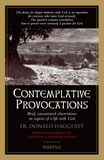Carl E. Olson's Blog, page 166
February 20, 2013
The McAleese Report shocker you'll not hear about in the MSM
by Carl E. Olson | Catholic World Report blog
Don't expect to hear much inthe U.S. media about the stunning McAlleese Report, especially not since the mythology of vicious, vile, and abusive Irish nuns running the the Magdalene Laundries has been so firmly established by Hollywood and the lame-stream media in recent years. The 1,000-page long "Report of the Inter-Departmental Committee to establish the facts of State involvement with the Magdalen Laundries" is the result of an in-depth and wide-ranging investigation into the infamous Laundries (a big ht to Dave Pierre, Jr., of TheMediaReport.com).
The atheist Brendan O'Neill, who is editor of spiked! (and whose journalistic integrity has long impressed me) summarized the Report recently in a blog post for The Telegraph:
The publication last week of the Irish government's McAleese Report on the Magdalene laundries has proved kind of awkward for Catholic-bashers. For if McAleese's thorough, 1,000-page study is to be believed, then it would appear that those laundries were not as evil and foul as they had been depicted over the past decade. Specifically the image of the laundries promoted by the popular, much-lauded film The Magdalene Sisters – which showed them as places where women were stripped, slapped, sexually abused and more – has been called into question by McAleese. This has led even The Irish Times, which never turns down an opportunity to wring its hands over Catholic wickedness, to say: "There is no escaping the fact that the [McAleese] report jars with popular perceptions."
In the Irish mind, and in the minds of everyone else who has seen or read one of the many films, plays and books about the Magdalene laundries, these were horrific institutions brimming with violence and overseen by sadistic, pervy nuns. Yet the McAleese Report found not a single incident of sexual abuse by a nun in a Magdalene laundry. Not one. Also, the vast majority of its interviewees said they were never physically punished in the laundries. As one woman said, "It has shocked me to read in papers that we were beat and our heads shaved and that we were badly treated by the nuns… I was not touched by any nun and I never saw anyone touched." The small number of cases of corporal punishment reported to McAleese consisted of the kind of thing that happened in many normal schools in the 1960s, 70s and 80s: being caned on the legs or rapped on the knuckles. The authors of the McAleese Report, having like the rest of us imbibed the popular image of the Magdalene laundries as nun-run concentration camps, seem to have been taken aback by "the number of women who spoke positively about the nuns".
As O'Neill points out, the approach taken by many media members now is that, well, hey, even if many or all of the more sensational accusations were false or wildly embellished, at least they did good by pointing out problems. He writes, "The idea of the 'good lie', the lie which helps open people's eyes to the existence of wickedness, should be anathema to anyone who cares about getting history right and establishing the truth." You would think. But, of course, the approach taken is a tried and true one. Just look at the example of Pope Pius XII, who no one thought was responsible for the persecution and death of Jews—until an anti-Catholic German playwright wrote "The Deputy" in the early 1960s, setting in motion the now prevalent—and false—image of an anti-Semitic, passive pontiff.
I've not, of course, read the entire Report, but here are a couple of important passages; first, from Chapter 19, which describes living and work conditions:
Benedict’s Finale with Beethoven: A “Heroic” Moment
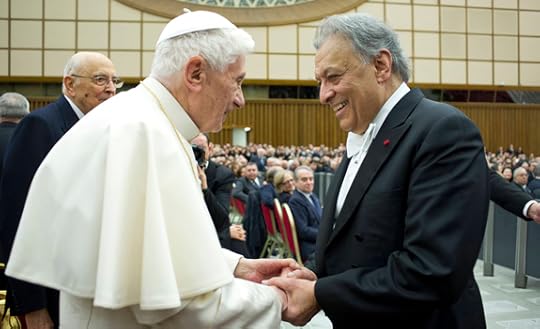
Benedict’s Finale with Beethoven: A “Heroic” Moment | Msgr. Daniel B. Gallagher | Catholic World Report
Pope Benedict’s pontificate comes to a fitting musical conclusion with a performance of Beethoven’s magnificent Eroica Symphony.
The last
weeks of Pope Benedict XVI’s pontificate will be filled with many “lasts.” Ash
Wednesday was his last public Mass. February 14 was his last meeting with
priests and seminarians of the Diocese of Rome. February 24 will be his last
Angelus. His last general audience will take place on February 27 before his
final transport to Castel Gandolfo via helicopter on February 28.
February 4
also marked a “last,” perhaps one that will not go down in the annals of
history as it should. Everybody knew it would be the last Vatican concert for
Giorgio Napolitano, president of the Italian Republic, before he finishes his
term as Head of State, but nobody imagined it would be the last concert for
Benedict XVI as Supreme Pontiff.
The Italian
Embassy to the Holy See offers the concert each year in commemoration of the Lateran
Treaty. The orchestra Maggio Musicale Fiorentino,
directed by Zubin Mehta, performed the overture to Giuseppe Verdi’s La forza del destino and Beethoven’s Eroica Symphony. It is a pity this
magnificent concert will forever be overshadowed by the events that followed in
its wake. Benedict and Mr. Napolitano, both avid music fans, enjoyed similar
occasions in the past, most notably at Castel Gandolfo last July when Daniel
Barenboim directed the West-East Divan Orchestra in a performance of
Beethoven’s Fifth and Sixth Symphonies.
As grand as
those pieces are, they simply do not match up to Beethoven’s revolutionary Third
Symphony in E-flat major, also known as the Eroica
(“Heroic”) Symphony.
The “Great Man” and what lies
beyond the grave
Too often
sensational tales about the composer’s life distract us from his music. For one
just getting into Beethoven, it would be best to listen to his symphonies before
picking up a biography. Knowing something about his life would certainly help,
but if we could go back in time and sit down with him, Beethoven would be much
more interested in playing his latest composition than in rattling on about
himself.
In no small
part, his eagerness to play rather than chat would be motivated by the
increasing deafness that began to assail him at the robust age of 30. It
eventually prompted him to write a letter to his brothers Karl and Johann now
known as the “Heiligenstadt Testament.” It is Ludwig’s excruciating apologia
for a reclusive lifestyle and the terrible misunderstandings it caused. Ludwig
begs his brothers to have his physician publically declare his condition after
his death so that the world “may become reconciled to me.”
Celebrating the 125th anniversary of the birth of Ronald Knox

Celebrating the 125th anniversary of the birth of Ronald Knox
Offer ends February 26th, 2013 at 12:00 midnight EST.
These prices are available online only through Ignatius.com
Throughout
the first half of the 20th century, both as an Anglican and as a Roman
Catholic, Ronald Knox was a well-known part of the English literary
landscape. He was a favored preacher for occasions great and small; his
articles on a host of topics found a place in the newspapers and monthly
literary magazines; his voice was heard often on the BBC. February
17th marked the 125th anniversary of his birth, which is cause for
celebration! Enjoy titles starting at 20% off either by or about the
great Ronald Knox.
Join Ignatius Press on a Saint Paul & Bible Lands Pilgrimage Cruise with Steve and Janet Ray
 Ignatius
Ignatius
Press with President Mark Brumley and Father Mark Mary invite you on a
Saint Paul & Biblical Lands Mediterranean Cruise and Pilgrimage led
by Steve and Janet Ray. For more information about this exciting two
week pilgrimage, click here.
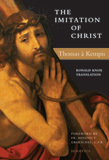 The Imitation of Christ
The Imitation of Christ
Translated by Ronald Knox and Michael Oakley
Thomas a Kempis
The spiritual classic by à Kempis, the second most widely read
spiritual book after the Bible, has had an astonishing impact on the
spiritual lives of countless saints, peasants, and popes for centuries.
This beautiful translation by Ronald Knox and Michael Oakley is
considered by many teachers, writers, and readers to be the best English
translation ever, and one that greatly enhances the life-changing
insights of Thomas à Kempis. Illustrated.
Regular price: $14.95, sale price: $11.96
 Ronald Knox as Apologist
Ronald Knox as Apologist
Milton Walsh
In this book, Milton Walsh, an expert on Knox's writing, has
analyzed and provided ample quotations from the most significant
writings of Knox that fall under the genre of apologetics. Knox was a
superb apologist because as a priest he was a man of deep faith, and as a
writer he had a wonderful way of expressing the Christian truths in an
elegant and clear language.
Regular price: $14.95, sale price: $11.96
 A Retreat for Lay People
A Retreat for Lay People
Fr. Ronald Knox
A Retreat for Lay People brings together a collection of
his conferences preached over a period of fifteen years. As in all his
writing, in these conferences Ronald Knox combines love for Scripture,
commitment to the Catholic faith, and sympathy for the struggles and
joys of Christian discipleship. A Retreat for Lay People is solid
spiritual food, served up with refreshing simplicity and a dash of wit. Also available as an e-book and audio download.
Regular price: $16.95, sale price: $13.56
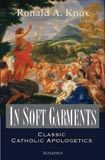 In Soft Garments
In Soft Garments
Fr. Ronald Knox
When the Holy See gave general permission for Catholics to study
again at Oxford and Cambridge, the stipulation was made that lectures be
offered to provide support for their faith, as Catholics would be a
minority in a rather hostile atmosphere. In the days when C. S. Lewis
and J. R. R. Tolkien trod the greens of Oxford, those lectures were
provided by the wise and witty Msgr. Ronald Knox, himself a convert to
the Catholic Church. Also available as an e-book and audio download.
Regular price: $14.95, sale price: $10.50
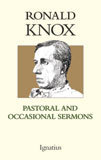 Pastoral and Occasional Sermons
Pastoral and Occasional Sermons
Fr. Ronald Knox
The highly esteemed Catholic convert, writer and apologist Ronald
Knox, a master of the English language, was well regarded for his gifts
both of writing and preaching. This volume combines both skills as it is
a collection of his homilies on all the important themes of the
spiritual and moral life, and on his favorite saints, men and women of
history who were "inflamed with the love of Christ".
Regular price: $49.95, sale price: $39.96
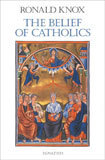 The Belief of Catholics
The Belief of Catholics
Fr. Ronald Knox
Ronald Knox was one of the most influential British
convert-writers of the 20th century. Of his many works, The Belief of
Catholics is his best-known book and his premiere piece of apologetics.
While it deals extensively with Protestantism, its target is more the
unchurched or lightly-church modern who, if he gives any thought at all
to Catholicism, thinks it mildly foreign. Also available as an e-book.
Regular price: $14.95, sale price: $11.96
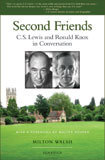 Second Friends
Second Friends
Milton Walsh
C. S. Lewis and Ronald Knox were two of the most popular authors
of Christian apologetics in the twentieth century ... and for many years
they were neighbors in Oxford. In Second Friends, Milton Walsh delves
into their writings and compares their views on a variety of compelling
topics, such as the existence of God, the divinity of Christ, the
problem of suffering, miracles, the way of Love, the role of religion in
society, prayer, and more. Also available as an e-book and audio download.
Regular price: $16.95, sale price: $13.56
The Hidden Stream
Fr. Ronald Knox
This book is a collection of stimulating, informal discussions in
which Msgr. Knox re-examines some of the fundamental precepts of the
Catholic faith as well as the formidable challenges facing Catholics
today. The Hidden Stream is a lucid refresher course in the
teachings of the Church for informed Catholics, a pleasant "must" for
uninformed ones, and a bulwark for all concerned with explaining the
faith to others.
Regular price: $14.95, sale price: $11.96
The Wine of Certitude
David Rooney
A well written and in-depth overview of the life and literary
accomplishments of Ronald Knox, the famous Catholic convert and
apologist from England who was a major figure in the English Catholic
literary revival in the first half of the twentieth century. Rooney
presents a look at the full range of Knox's writings including his
apologetics, detective fiction, satire and other genres, offering an
intellectual portrait that is fascinating and engaging.
Regular price: $14.95, sale price: $2.95
Literary Converts
Joseph Pearce
Literary Converts is a biographical exploration into the
spiritual lives of some of the greatest writers in the English language:
Oscar Wilde, Evelyn Waugh, C.S. Lewis, Malcolm Muggeridge, Graham
Greene, Ronald Knox, Siegfried Sassoon, Hilaire Belloc, G.K. Chesterton,
Dorothy Sayers, T.S. Eliot and J.R.R. Tolkien. Also available as an e-book.
Regular price: $19.95, sale price: $15.96
Classic Catholic Converts
Fr. Charles P. Connor
Classic Catholic Converts presents the compelling stories of
over 25 well-known converts to Catholicism from the 19th and 20th
centuries. It tells of powerful testimonials to God's grace, men and
women from all walks of life in Europe and America whose search for the
fullness of truth led them to the Catholic Church. Among the famous
converts whose stories are told here include John Henry Newman, Edith
Stein, G.K. Chesterton, Ronald Knox and many more. Also available as an e-book.
Regular price: $14.95, sale price: $11.96
Audio Downloads
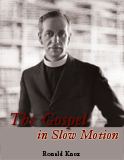 The Gospel in Slow Motion
The Gospel in Slow Motion
Ronald Knox
The Gospel in Slow Motion are sermons delivered to the schoolgirls at Aldenham Park during World War II.
Regular price: $39.95, sale price: $31.96
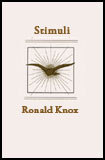 Stimuli
Stimuli
Fr. Ronald Knox
This classic work by Knox is a collection of sermons following the
liturgical year. Topical to the seasons but universal in appeal, each
short sermon addresses its topic with the usual eloquence and erudition
that readers of Knox expect and enjoy.
Regular price: $24.95, sale price: $19.96
 Retreat for Beginners
Retreat for Beginners
Fr. Ronald Knox
Renowned as a public speaker and translator of the Bible, Ronald
Knox was above all a priest, and in his sermons and retreat conferences
we meet Msgr. Knox the spiritual guide. In Retreat for Beginners
we find the spiritual depth and imaginative presentation that were
hallmarks of Knox's preaching, and an informality that appeals to young
people – and to the youth in each of us.
Regular price: $24.95, sale price: $19.96
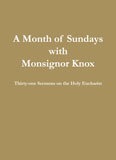 A Month Of Sundays With Monsignor Knox
A Month Of Sundays With Monsignor Knox
Although they are solidly doctrinal, these talks are not lectures,
but sermons intended to increase our love for the Eucharistic Lord.
Knox speaks as a pastor, and his sermons are marked by an awareness of
our human condition. Many of us who receive the Eucharist daily are
troubled by the nagging question of whether we are making any progress
in our spiritual life at all. Monsignor Knox knows that struggle
first-hand, and his counsel is both comforting and challenging.
Regular price: $11.95, sale price: $9.56
Catholic World Report
The Pope and the Philistines
by Tracey Rowland
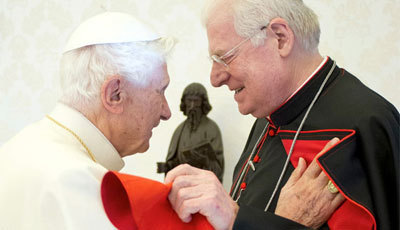
Benedict XVI’s papacy has been one of imagination and urbanity hampered by bureaucracy.
In Called to Communion, published in 1996, a decade before
the beginning of his papacy, Joseph Ratzinger had some strong words to
say about the bureaucratic machinery of the Church. He wrote: “The more
administrative machinery we construct, be it the most modern, the less
place there is for the Spirit, the less place there is for the Lord, and
the less freedom there is.”
He added that in his opinion, "we ought to begin an unsparing
examination of conscience on this point at all levels of the Church".
In a later collection of essays, titled Images of Hope, he
observed that “the saints were all people of imagination, not
functionaries of apparatuses.” In recent days one senses that this
unsparing examination of conscience might finally have begun. One also
senses that in the papacy of Benedict XVI the Church had one of the
greatest theologians occupying the Chair of Peter in centuries, but that
for all his high intelligence, he never quite managed to contend with
the bureaucratic machinery and it often let him down.
Homiletic & Pastoral Review
Imitation of Jesus, Priest and Victim, and the Grace of Celibacy
Fr. Dwight Campbell
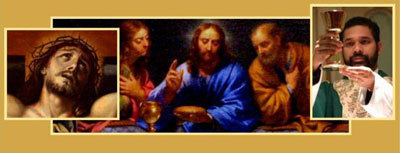
By reason of our priestly consecration, we are called to be perfect
imitators of Christ; we are called to be priests and victims in the
manner of Jesus who is the Priest and Victim.
Our Savior, Jesus Christ, is the Eternal High Priest who offered
himself on the Cross as the true Paschal Lamb and Unblemished Victim for
our redemption. By reason of our priestly consecration, we are called
to be perfect imitators of him; we are called to be priests and victims
in the manner of Jesus who is the Priest and Victim.
In his homily for the Chrism Mass of 2009, Pope Benedict XVI links
Christ’s dual role as Priest and Victim to Our Lord’s own priestly
prayer of consecration at the Last Supper, and shows how, with these
same words, Jesus instituted the priesthood with his Apostles. At his
Last Supper discourse, our Lord invokes the Father and prays: “Sanctify
them in the truth; your word is truth. As you sent me into the world,
so I have sent them into the world. And for their sake I consecrate
myself, so that they also may be consecrated in truth” (Jn 17:17-19).
For Additional Sale Items Click HERE!
Items are not sold on approval.
Periodically we make available -- only to you, our valued repeat
customers -- special offers which are not available to the general
public. We offer these discounted prices as our gift to those who help
us by using Ignatius.com. Please do not ask for retroactive price
consideration. We cannot accommodate those requests. Many thanks.
February 19, 2013
Sometimes you simply have to laugh...
... otherwise you might be forced to take seriously the foolishness that seems to dominate the internet, the airwaves, and the supposedly serious, important newspapers of note. So, as something of a humor break (and, no, I'm not going to reference the Grammys or the State of the Union Address, despite the ripe material), here are three stories that had me chuckling recently.
• On the day the news broke in Rome, Cliff Kinkaid of the conservative group, Accuracy in Media, penned a rather breathless piece titled, "Pope’s Possible Successor Promotes Marxist for Sainthood". When I first saw the headline, I thought it must be refering to some Italian or French Cardinal. Nope, not at all:
American Catholic Cardinal Timothy Dolan, reported to be in the running to replace Pope Benedict XVI as the head of the Roman Catholic Church, is usually described as a “conservative” because he has strongly criticized President Obama’s attacks on religious liberty and federal intrusions into church affairs. But Dolan is also the leader of the campaign to promote Marxist Dorothy Day for Sainthood.
One report asks, “Could Timothy Dolan Become The First American Pope?” Dolan, president of the United States Conference of Catholic Bishops (USCCB,) is considered the voice of U.S. Catholicism.
But Carol Byrne, author of The Catholic Worker Movement (1933-1980): A Critical Analysis, says Dolan manipulated a vote by the United States Conference of Catholic Bishops last November to move forward with the canonization of Dorothy Day, even though The New York Times itself noted that some of the Bishops said “she had an abortion as a young woman and at one point flirted with joining the Communist Party.”
In other news, it was recently revealed that one of the Church's greatest Doctors was a New Age-y gnostic who had a longtime mistress. But, hey, who cares about St. Augustine's life prior to conversion when we have Dorothy Day's life prior to conversion? The funny thing, however, was that Pope Benedict XVI, in his February 14th Ash Wednesday general audience, said the following:
New: "Contemplative Provocations"
Now available from Ignatius Press:
by Fr. Donald Haggerty
• Also available in Electronic Book Format
A great many religious people undertake, at least for a time, a serious dedication to prayer. They are moved by a longing for a deeper encounter with God, and the possibility of this beckons them as a distant light at night on the sea. Yet far fewer in number become true contemplative souls, for it is difficult to continue the quest for God in the face of many obstacles.
For those who are spiritually courageous and full of desire for God, this book cannot but provoke them to begin or to persevere in this ultimate adventure in life-the more complete discovery of the living God. Thematically unified by the notion of God's ultimate transcendence to our limited human knowledge, Contemplative Provocations offers a rich profusion of insights on the life of prayer and the pursuit of God.
A key to spiritual growth is the understanding that the hiddenness of God becomes a paradox in the experience of a soul seeking him wholeheartedly. Rather than enjoying a more intimate familiarity with God, the soul advancing in prayer is likely to experience more intensely, more provocatively, the concealment of God. This surprising truth undergirds true contemplative prayer. It is a reason why every contemplative soul, and every saint, is inflamed with a never satisfied thirst for God.
Fr. Donald Haggerty, of the Archdiocese of New York, is a Professor of Moral Theology at the Capuchin Institute of Philosophy and Theology in Addis Ababa, Ethiopia. He previously taught at Saint Joseph's Seminary in New York and Mount Saint Mary's Seminary in Maryland. He is the editor of Modern Moral Problems, a collection of writings by Msgr. William B. Smith.
The format and style of this book has a contemplative appeal. The reflections based upon the Church's rich tradition of contemplative prayer are short and concise, stimulating the intuition. They can be read independently a few at a time, or as a series of connected thoughts. Most importantly, they provoke a desire to enter more generously into one's own relationship with God."This is a masterful work. It contains a tremendous amount of very helpful spiritual advice."
- Fr. Joseph Koterski, S.J., Fordham University
"The work has the feel and style of a spiritual classic, and I hope it will be recognized as one."
- Rev. John J. Coughlin, O.F.M., University of Notre Dame
"Insights into the spiritual life far surpassing the vast majority of books on spirituality."
- John M. McDermott, S.J., Sacred Heart Major Seminary
February 18, 2013
The Pope and the Philistines
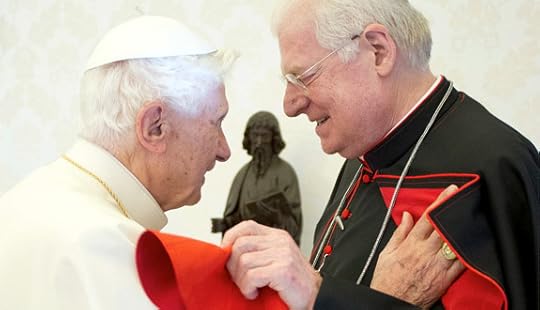
The Pope and the Philistines |
Tracey Rowland | Catholic World Report
Benedict XVI’s papacy has been
one of imagination and urbanity hampered by bureaucracy
In Called to Communion, published in 1996, a decade before the beginning of
his papacy, Joseph Ratzinger had some strong words to say about the
bureaucratic machinery of the Church.
He wrote:
The more administrative machinery we construct, be it the
most modern, the less place
there is for the Spirit, the less place there is for the Lord, and the less freedom
there is.
He added
that in his opinion, "we ought to begin an unsparing examination of
conscience on this point at all levels of the Church". In a later collection of essays, titled
Images of Hope, he observed that “the
saints were all people of imagination, not functionaries of apparatuses.”
In recent
days one senses that this unsparing examination of conscience might finally
have begun. One also senses that
in the papacy of Benedict XVI the Church had one of the greatest theologians
occupying the Chair of Peter in centuries, but that for all his high
intelligence, he never quite managed to contend with the bureaucratic machinery
and it often let him down.
The
decision to abdicate would not have been a decision made lightly given
Benedict’s respect for historical precedent and the sacramental nature of his
office. He is the last person on
the planet to think of the papacy as a job. He never thought of himself as the CEO of a multinational
corporation and he sharply rebuked those whose ecclesiology was borrowed from
the Harvard School of Business or, worse, some Green-Left women's
collective. Christ was and is a
Priest, a Prophet and a King, not a business manager. Benedict believes that the Church is nothing less than the
Universal Sacrament of Salvation and the Bride of Christ. For him the keys of Peter are no mere
mythic symbol. So a decision to
abdicate could only have been made on the basis that he thought worse things
might happen to embarrass and confuse the Church's 1.2 billion faithful if he
lacked the strength to govern.
Possible Like-Minded Successors
The
challenge in choosing Benedict’s successor is finding someone who has the
strength and ability to deal with the administrative side of the office of the
papacy while retaining at least some of the intellectual flair and imagination
of Benedict and his predecessor.
There are many who think that either Cardinal Angelo Scola or Cardinal
Marc Ouellet could carry these responsibilities. Certainly both are exceptionally intellectually gifted and
are men of imagination, not functionaries. They are also in a similar intellectual mould to
Benedict. They share the same
interpretations of the Second Vatican Council and they are very much across the
theological anthropology and moral theology of Blessed John Paul II.
On the Mind of the Pope
V. Schall, S.J. | Catholic World Report blog
It
so happens that the Holy Father, who is six months older than Schall,
announced his retirement about six months after Schall announced his.
As far as we know, no causal connection can be established, though
several of my friends suspect collusion. In fact, the pope’s
intentions to retire have been hinted at all along by his attention
to previously resigned popes. His given reasons are pretty much the
same ones that I use—one grows weaker with age; no one wants to
leave an institution in emergency situations.
When Benedict first
announced his resignation, I assumed that he would return to some
appropriately quiet convent in Germany for his last years, perhaps
with his priest brother. Or he might go to the Villa Helios, run by
some German nuns on the Isle of Capri, at which the German Jesuits at
the Gregorian University in Rome liked to stay when I was there. On
second thought, Benedict is also an historian. Any reader of Tacitus
would know about the unsettling residence of the Emperors Tiberius
and Caligula on Capri. Too much unwelcome symbolism would be seen in
such a move. Evidently Benedict will stay in the Vatican.
The
mechanism for the election of a successor to Benedict is now in
place. My chances of accurately picking the new pope are about the
same as my chances of picking the winner of the NCAA basketball
tournament in March or the winner of the Kentucky Derby in May. We
presume that something more is at work in the selection of a new pope
than pure luck.
Since at least Pius
IX in the 1800s, the Catholic Church has had at its helm a series of
rather outstanding men. The last two popes certainly have been
extraordinary, almost as if they were “chosen” by powers beyond
the capacities of the men who selected them. No political institution
with its “democratic” or hereditary processes for selecting
presidents and leaders can match that record over time.
Continue reading on the CWR blog.
February 16, 2013
The Temptation reveals three important things
A Scriptural Reflection on the Readings for Sunday, February 17, 2013, the First Sunday of Lent | Carl E. Olson
Readings:
• Dt 26:4-10
• Ps 91:1-2, 10-11, 12-13, 14-15
• Rom 10:8-13
• Lk 4:1-13
“The whole story of the Temptation is misconceived,” wrote Monsignor Ronald
Knox, “if we do not recognize that it was an attempt made by Satan to find out
whether our Lord was the Son of God or not.” In so writing, he echoed many of
the Church Fathers, who pondered the question of what Satan knew and what he
wished to accomplish in tempting Jesus in the desert. St. Ephrem the Syrian
wrote, “He tempted Jesus because a definite sign of Christ’s divinity had not
yet been given from heaven.” Yes, Ephrem noted, Satan was aware of Jesus’
baptism, but thought the true identity of Jesus couldn’t be known until he was
tested in spiritual combat, through temptation.
It is a point worth contemplating on this first Sunday of
Lent for three reasons: temptation reveals the nature of our enemy, it reveals
the reality of our situation, and it reveals the identity of the sons and
daughters of God.
The enemy has many names, including Beelzebul, the evil one,
the ruler of the demons and of this world, the serpent, and the tempter. He is
not a metaphor or a myth, but a real creature, a fallen angel. Pope Paul VI, in
an audience titled, “Confronting the Devil’s power” (Nov. 15, 1972), said that
refusing to acknowledge the devil’s existence or to explain him away as “a
pseudo-reality, a conceptual, fanciful personification of the unknown causes of
our misfortunes” is a complete rejection of Scripture and Church teaching. Ironically,
the refusal of so many—including not a few Catholics—to admit the true identity
of the devil is itself a dark triumph for the great deceiver.
The name “the devil,” comes from the Greek word diabolos (Latin, diabolus), which means “slanderer” or “accuser.” He seeks to
accuse and slander each of us before God in his relentless desire to destroy
souls. In doing so he has a certain advantage, namely, that on our own merits
we have no real defense against his accusations. The reality of our situation is
stark: we are sinners who often give into temptation and, in doing so, make
ourselves subjects of the ruler of this world.
This fact is part and parcel of Jesus’ forty days in the
desert. His time there was a purposeful re-enactment of the forty years the
Israelites spent wandering in the desert. But whereas the Israelites failed,
repeatedly, to obey, trust, and worship God, Jesus overcame the devil’s
attempts to have him disobey, distrust, and deny God. “At the heart of the
temptations,” notes Pope Benedict XVI in Jesus of Nazareth, “as we see here, is the act of pushing God aside
because we perceive him as secondary, if not actually superfluous and annoying,
in comparison with all the apparently far more urgent matters that fill our
lives.”
We are rarely tempted to flatly deny the existence of God or
to publicly curse him. Rather, we are tempted to gradually replace God, the
highest good, with lesser goods: food, comfort, safety, possessions, and
position. People rarely go from Christian to atheist in a matter of days or
weeks. As Benedict points out, the devil is just as pleased when we demand that
God caters to our wishes as he is when we reject God altogether. They are, in
the end, not so different, especially when it comes to destroying the life of grace.
“But,” some protest, “Jesus had an advantage: he is God!”
Yet all who are baptized into Christ have put on Christ (cf. Rom 6). We are
children of God because, by the work of Jesus, we are filled with the Holy
Spirit. Today’s epistle states what is required in the face of temptation and
trials: confess with your mouth that Jesus is Lord and believe in your heart
that God raised him from the dead.
In facing the enemy and rejecting temptation, Jesus revealed
himself. Lent is our opportunity to do the same, in the name and power of the
Lord.
(This "Opening the Word" column originally appeared in the February 21, 2010, edition of Our Sunday Visitor newspaper.)
Deacon R. William Steltemeier, Jr., Requiescat in pace
by Carl E. Olson
I had the pleasure of meeting and visiting a bit with Dn. Steltemeier on my trips to EWTN, and he was always very gracious and encouraging. May God grant him eternal rest.
From EWTN News:
Deacon R. William Steltemeier, Jr., founding president of the Eternal Word Television Network, died in Hanceville, Ala. on Feb. 15 at the age of 83 after a lengthy illness.
Michael P. Warsaw, current network president and CEO, called Deacon Steltemeier “a man of incredible faithfulness,” noting that only EWTN founder Mother Angelica was more closely associated with the network.
“As a husband, a father, an attorney and in his vocation as a permanent deacon, Bill always remained focused on serving God and serving others,” Warsaw said.
“He devoted himself totally to Mother Angelica’s mission and sacrificed all he had to help her build EWTN into the tremendous vehicle for evangelization that it has become.”
Warsaw added: “While we mourn his passing, we take comfort from his own example of faith and are confident he has heard those words from the Gospel of Matthew, 'Well done good and faithful servant…enter into the joy of your master.'”
Deacon Steltemeier was born in Nashville, Tenn. on June 6, 1929. He married Ramona Schnupp on Aug. 22, 1953. He graduated from Vanderbilt University and Vanderbilt Law School before entering the U.S. Army and serving for two years in France.
He co-founded the law firm of Steltemeier & Westbrooke in Nashville in 1960. The firm specializes in bankruptcy and commercial law and continues to operate today.
Bishop Joseph A. Durick of Nashville ordained Steltemeier to the diaconate on April 26, 1975. He was among the first American men ordained to the permanent diaconate.
February 15, 2013
A Figure of Impossibility
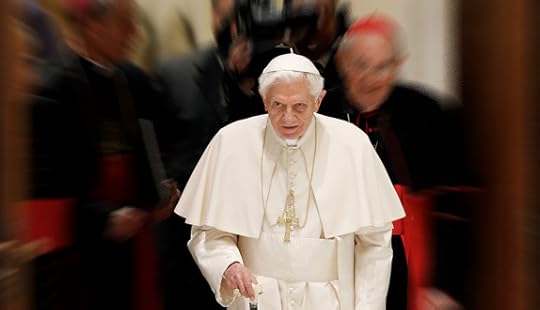
A Figure of Impossibility | Carl E. Olson | Editorial | Catholic World Report
The pontificate of Benedict XVI has been a short, bracing, and often surprising journey in discipleship.
“The rejection of the primacy of St. Peter has driven men on to a slippery course, where all the steps are downwards.”— Lord Acton
It has been quite a week. My head is still spinning, and I'm sure that only half of it is due to the flu, fever, and medication I've been fighting, enduring, and imbibing (respectively) since last Sunday afternoon.
I.
Where to start? How about with the head of the Catholic Church?
Consider: He is brilliant, yet enigmatic. Some find him inspiring; others think he is frightening. Some insist his reign is the result of mythology, superstition, and ignorance. Others claim he is the personification of humility, service, and true charity. In some corners, he is rejected for his politically incorrect views about marriage and sexuality, and his insistence that only certain men, no women at all, can be priests or bishops. His talk of sin and of eternal judgment has upset many, but his call to discipleship, sacrifice, and humble worship resonates with countless millions.
But there has often been talk of scandal. One of those closest to him betrayed his trust, exposing him to ridicule. There was even talk of arrest and prosecution. Some within his inner circle have apparently been more interested in pursuing power than in service. He is, in short, controversial—a lightning rod for debate, discussion and, sadly, division.
Carl E. Olson's Blog
- Carl E. Olson's profile
- 20 followers


